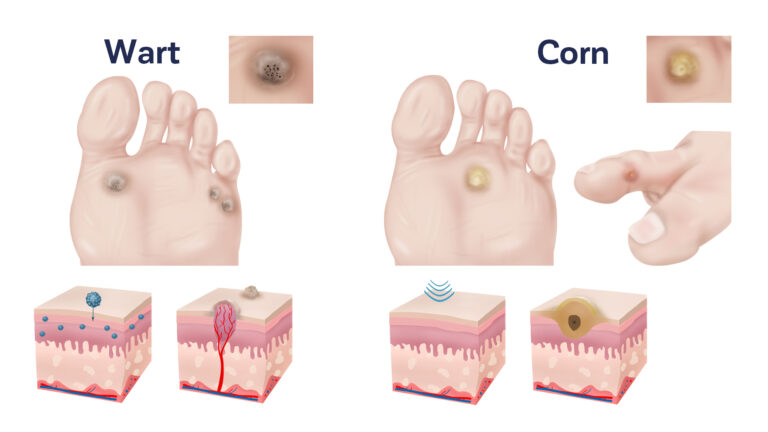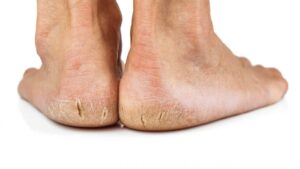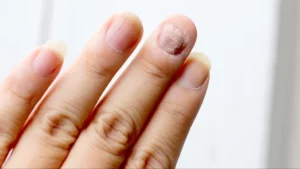A Comparison of Corn and Wart
Understanding the differences between corns and warts, particularly plantar warts, can be challenging. Both are common skin conditions that can cause discomfort and confusion.
This article aims to clarify these differences, providing a comprehensive comparison of corns and warts. We’ll delve into their causes, symptoms, and treatment options.
Whether you’re dealing with these conditions or simply seeking knowledge, this guide will serve as a valuable resource. Let’s explore the world of corns and warts together.
Understanding Corns: Definition and Characteristics
Corns are small, hard areas of skin that often develop on the feet. They’re typically caused by friction or pressure from ill-fitting shoes.
Corns have a hard center, surrounded by inflamed skin. They’re usually round in shape and can cause discomfort when pressed.
Unlike warts, corns are not contagious and are more common in adults than in children.
Understanding Warts: Definition and Characteristics
Warts are skin growths caused by the human papillomavirus (HPV). They can appear anywhere on the body, including the feet.
Plantar warts, specifically, grow on the soles of the feet. Unlike corns, they’re often flat due to the pressure of walking and standing.
Warts can be painful, especially when squeezed from the sides, and are contagious. They’re more common in children than adults.
Corn vs Wart: Identifying the Differences
Corns and warts, while similar in appearance, have distinct differences. Understanding these can help in self-diagnosis and treatment.
Corns are typically round, hard, and dry. They have a clear center and can be painful when pressed. On the other hand, warts are rough, flat or slightly raised, and may have black dots.
Here are some key differences:
- Corns are caused by pressure and friction, while warts are caused by HPV.
- Corns are not contagious, but warts are.
- Corns often occur on areas that bear weight, while warts can appear anywhere.
Remember, professional diagnosis is always best for skin conditions.
Causes and Symptoms: Corns vs Plantar Warts
Corns are primarily caused by pressure and friction. They often develop on bony areas of the foot due to ill-fitting shoes. Symptoms include a hard, painful lump and flaky, dry skin.
On the other hand, plantar warts are caused by the human papillomavirus (HPV). They usually appear on the soles of the feet. Symptoms include a rough, flat growth and pain when walking or standing.
Both conditions can cause discomfort, but their causes and symptoms are distinct.
Treatment Options: Corn Removal and Wart Treatment
For corns, over-the-counter treatments often include salicylic acid. This helps to soften and remove the hardened skin. Padding can also be used to reduce pressure on the corn.
Warts, however, may require more aggressive treatment. Cryotherapy, or freezing, is a common method. Salicylic acid can also be used to gradually peel away the wart.
It’s important to remember that treatment varies based on the individual and the severity of the condition. Always consult a healthcare professional for the best course of action.
Prevention Tips: Avoiding Corns and Warts
Preventing corns often involves proper footwear. Shoes should be comfortable, well-fitted, and not cause friction. Orthotics can also help distribute pressure evenly.
Warts, being viral, require good hygiene to prevent. Avoid direct contact with warts, and don’t share personal items like towels or shoes.
Remember, prevention is always better than cure. Regular foot care and hygiene can go a long way in avoiding these skin conditions.
When to See a Doctor: Professional Advice for Skin Conditions
If corns or warts become painful, it’s time to see a doctor. Persistent skin growths that don’t improve with over-the-counter treatments should also be evaluated.
For individuals with diabetes or poor circulation, professional evaluation is crucial. These conditions can complicate treatment and increase the risk of complications.
Remember, while self-diagnosis can be helpful, it’s not a substitute for professional medical advice. Always consult a Podiatrist for persistent or concerning skin conditions.
Read more about The Causes and Treatment of Corns or Marigold Treatments for Warts










